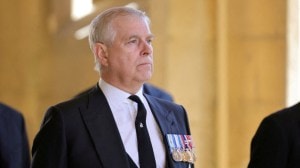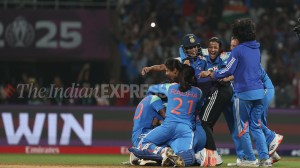Neither Raj nor Nath
It can't be denied that infighting and factionalism in central leadership of BJP has got acute,personalised and vicious during Rajnath's time.
At a recent meeting of the BJPs Parliamentary Board to decide the fate of Vasundhara Raje,the eight-odd leaders present were faced with a piquant situation no one was ready to communicate the decision that she step down as the leader of the Legislative Party in Rajasthan to the mediapersons waiting outside.
Arun Jaitley and Sushma Swaraj turned down the request to speak to the Press,and it was left to Rajnath himself to announce that Raje would hopefully accept the high commands wishes (to quit) even if no time frame had been set for her resignation.
Jaitley and Sushmas reluctance to speak to the Press was understandable Raje commanded an overwhelming majority in the 78-member Legislative Party in the state (as many as 57 of her supporters had descended on Delhis Prithviraj Road,along which are located both L K Advanis residence and Rajasthan Bhawan),but she was being told to pave way for another leader,said to be a favourite of the local RSS unit (which never enjoyed high credibility anyway).
Rajnaths argument for Vasundharas head was fairly simple a decision to this effect had been taken in the partys core group (which had thus Advanis seal of approval),and hence Raje must acquiesce. The said core group (truncated,with several leaders not present) had,however,also decided that the timing of the decision would be discussed among the party brass and a couple of observers would be sent to the state before Rajes relocation to Delhi something that Rajnath chose to ignore.
This was not the first occasion where Rajnaths handling of state affairs came under a severe attack. His experiments,while attempting a change of guard in Bihar,or while enforcing one in Uttarakhand,had shown that sustained meddling by central leaders could irreversibly corrode state leaderships once touted as the partys USP all over the country.
While the BJP president alone cannot be held responsible,what cant be denied is that infighting and factionalism in the central leadership of the party has got acute,personalised and vicious during Rajnaths time. Rajnaths supporters blame his rivals for this. Others counter that since Rajnath owes his position in the party to the RSS (specifically to its joint general secretary Suresh Soni),it is only natural that pandering to their wishes would take precedence over everything else for him.
Beginning his career as an ABVP organising secretary in Gorakhpur in the early 70s,Rajnath was fascinated by Atal Behari Vajpayees oratorical skills,and cultivated a style similar to his. After having served as BJP youth wing president,he became the Uttar Pradesh education minister in 1991 when the Anti Copying Act,piloted by him,earned countrywide notice.
Rajnaths term as the Uttar Pradesh BJP president in the late 90s,however,is remembered more for the erosion of the organisation in the state. While in 1991,under the Kalyan Singh-led government,the BJP was known for its support base cutting across caste lines,Rajnaths critics charge him with promoting Thakurs at the cost of others,and reducing the party to a conglomerate of various factions. His proximity to the RSS,however,ensured that his rise in the saffron brotherhood was steady.
Having served the state in various capacities,including as chief minister,he rose to head the BJP in the aftermath of the controversy over Advanis Jinnah remarks. All along,a sharp political mind and an avid astrologer,Sudhanshu Trivedi,served him as a key aide.
Rajnaths rise to the top in the BJP was not without its share of hiccups,though. He nursed the grudge that Advani handpicked and groomed most of the second-rung leaders in the BJP,including Arun Jaitley,Sushma Swaraj,Ananth Kumar and Venkaiah Naidu,a sub-system that that treated him an outsider. While there were huge problems among the four Advani followers themselves,Rajnaths unease with this sub-system was best exemplified by his long-standing rivalry with Jaitley.
The Rajnath-Jaitlety divide had many dimensions Hindi vs English; Hindutva vs Moderate; village-centric focus vs urban-centric outlook,to cite a few. This personal,multi-layered rivalry that gnawed at the fundamentals of the BJP was most distinctly visible during its parliamentary election campaign,and was cited as one of the key reasons by various state units in their reports on the poll losses.
While Advani single-handedly created the BJP and thus hugely expanded the democratic space in the country (we created a bipolar polity,is his favourite refrain),he was,however,not able to similarly democratise the space within the BJP. Most of his handpicked men and women often did their time in the Rajya Sabha,while also working as arbiters of fates of millions of party workers and leaders across the country. In what proved to be an act of overreach,Rajnath,taking a cue from Advani,too attempted to create a bureaucracy of his own with his own men and women in various state units,as also in some positions in the central BJP.
There were two crucial differences between the two,though. For one,while Advani single-handedly raised the BJP to bring it on a par with Indias Grand Old Party,Rajnath was not really able to take the idea of BJP further. While he did introduce measures like one-third quota for women in the organisation,under his leadership,the BJPs downward spiral,even in his home state of Uttar Pradesh,could not be arrested. For another,while Advanis chosen few were seen as individuals with exceptional personal attributes,Rajnaths handpicked ones never went very far.
The idea of the BJP defining the Opposition space in Indian Democracy,over a period of time,thus got reduced to petty,personal,egoistic and vicious feuds between groups,sub-groups,and then individuals in those sub-groups.



- 017 hours ago
- 027 hours ago
- 037 hours ago
- 045 hours ago
- 057 hours ago




























